Ethical Guidelines for Research: Data, Consent, and Recruitment
VerifiedAdded on 2022/09/30
|8
|2187
|309
Homework Assignment
AI Summary
This assignment presents a detailed examination of research ethics, focusing on critical aspects such as data confidentiality, informed consent, and participant recruitment. The document meticulously addresses various scenarios, including the security and retention of research data, ensuring full confidentiality, and the potential identification of participants. It also covers the necessity of informed consent, the rights of participants, and the methods of recruiting participants. The assignment further explores online and internet research considerations, including data collection via electronic media, potential risks, and the use of survey software. Additionally, it addresses travel-related aspects of the project, highlighting the importance of risk assessment and precautions for data collection off-campus and outside the UK. The document emphasizes adherence to data protection regulations and the need for secure data management practices, providing a comprehensive overview of ethical research conduct.
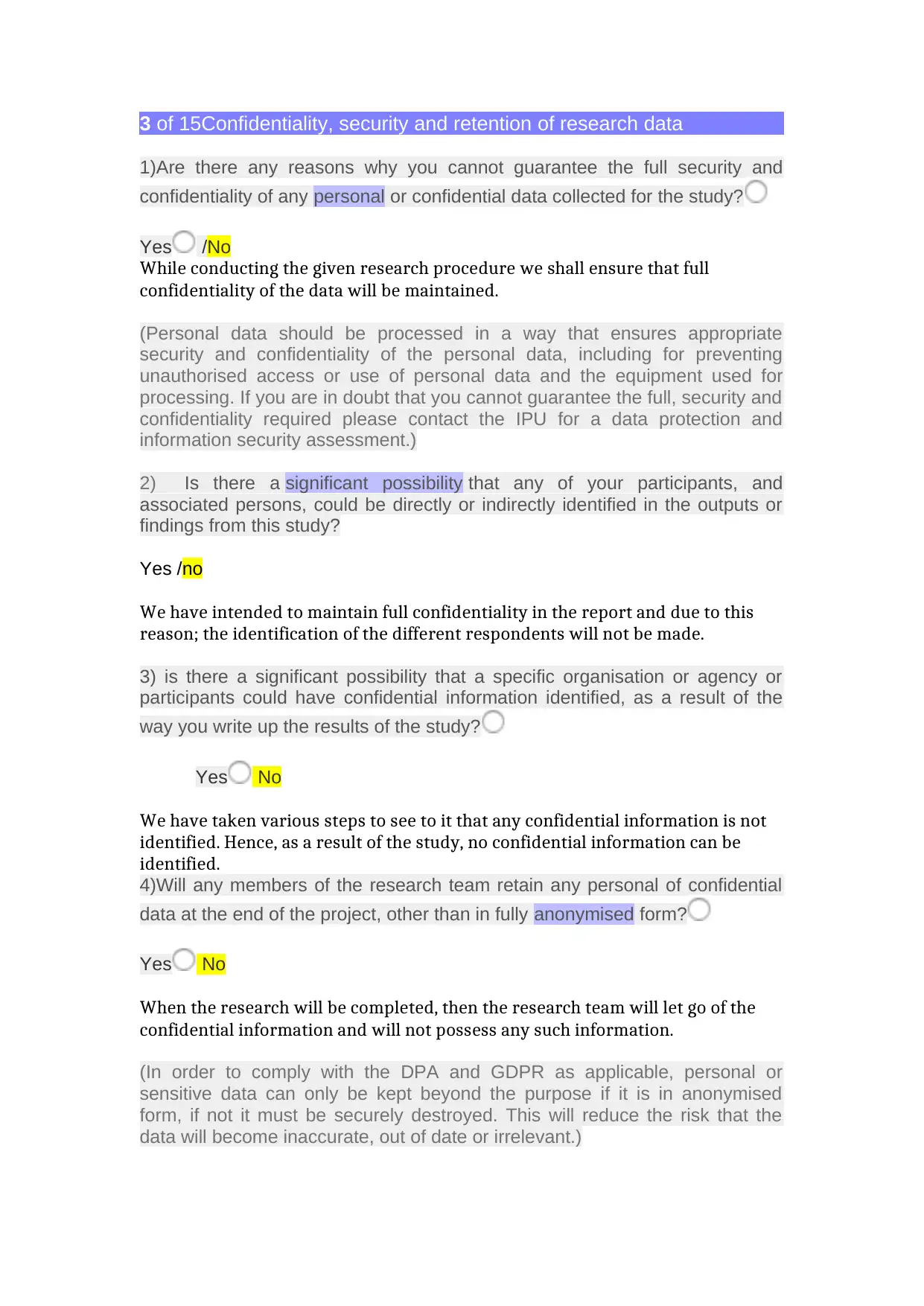
3 of 15Confidentiality, security and retention of research data
1)Are there any reasons why you cannot guarantee the full security and
confidentiality of any personal or confidential data collected for the study?
Yes /No
While conducting the given research procedure we shall ensure that full
confidentiality of the data will be maintained.
(Personal data should be processed in a way that ensures appropriate
security and confidentiality of the personal data, including for preventing
unauthorised access or use of personal data and the equipment used for
processing. If you are in doubt that you cannot guarantee the full, security and
confidentiality required please contact the IPU for a data protection and
information security assessment.)
2) Is there a significant possibility that any of your participants, and
associated persons, could be directly or indirectly identified in the outputs or
findings from this study?
Yes /no
We have intended to maintain full confidentiality in the report and due to this
reason; the identification of the different respondents will not be made.
3) is there a significant possibility that a specific organisation or agency or
participants could have confidential information identified, as a result of the
way you write up the results of the study?
Yes No
We have taken various steps to see to it that any confidential information is not
identified. Hence, as a result of the study, no confidential information can be
identified.
4)Will any members of the research team retain any personal of confidential
data at the end of the project, other than in fully anonymised form?
Yes No
When the research will be completed, then the research team will let go of the
confidential information and will not possess any such information.
(In order to comply with the DPA and GDPR as applicable, personal or
sensitive data can only be kept beyond the purpose if it is in anonymised
form, if not it must be securely destroyed. This will reduce the risk that the
data will become inaccurate, out of date or irrelevant.)
1)Are there any reasons why you cannot guarantee the full security and
confidentiality of any personal or confidential data collected for the study?
Yes /No
While conducting the given research procedure we shall ensure that full
confidentiality of the data will be maintained.
(Personal data should be processed in a way that ensures appropriate
security and confidentiality of the personal data, including for preventing
unauthorised access or use of personal data and the equipment used for
processing. If you are in doubt that you cannot guarantee the full, security and
confidentiality required please contact the IPU for a data protection and
information security assessment.)
2) Is there a significant possibility that any of your participants, and
associated persons, could be directly or indirectly identified in the outputs or
findings from this study?
Yes /no
We have intended to maintain full confidentiality in the report and due to this
reason; the identification of the different respondents will not be made.
3) is there a significant possibility that a specific organisation or agency or
participants could have confidential information identified, as a result of the
way you write up the results of the study?
Yes No
We have taken various steps to see to it that any confidential information is not
identified. Hence, as a result of the study, no confidential information can be
identified.
4)Will any members of the research team retain any personal of confidential
data at the end of the project, other than in fully anonymised form?
Yes No
When the research will be completed, then the research team will let go of the
confidential information and will not possess any such information.
(In order to comply with the DPA and GDPR as applicable, personal or
sensitive data can only be kept beyond the purpose if it is in anonymised
form, if not it must be securely destroyed. This will reduce the risk that the
data will become inaccurate, out of date or irrelevant.)
Paraphrase This Document
Need a fresh take? Get an instant paraphrase of this document with our AI Paraphraser
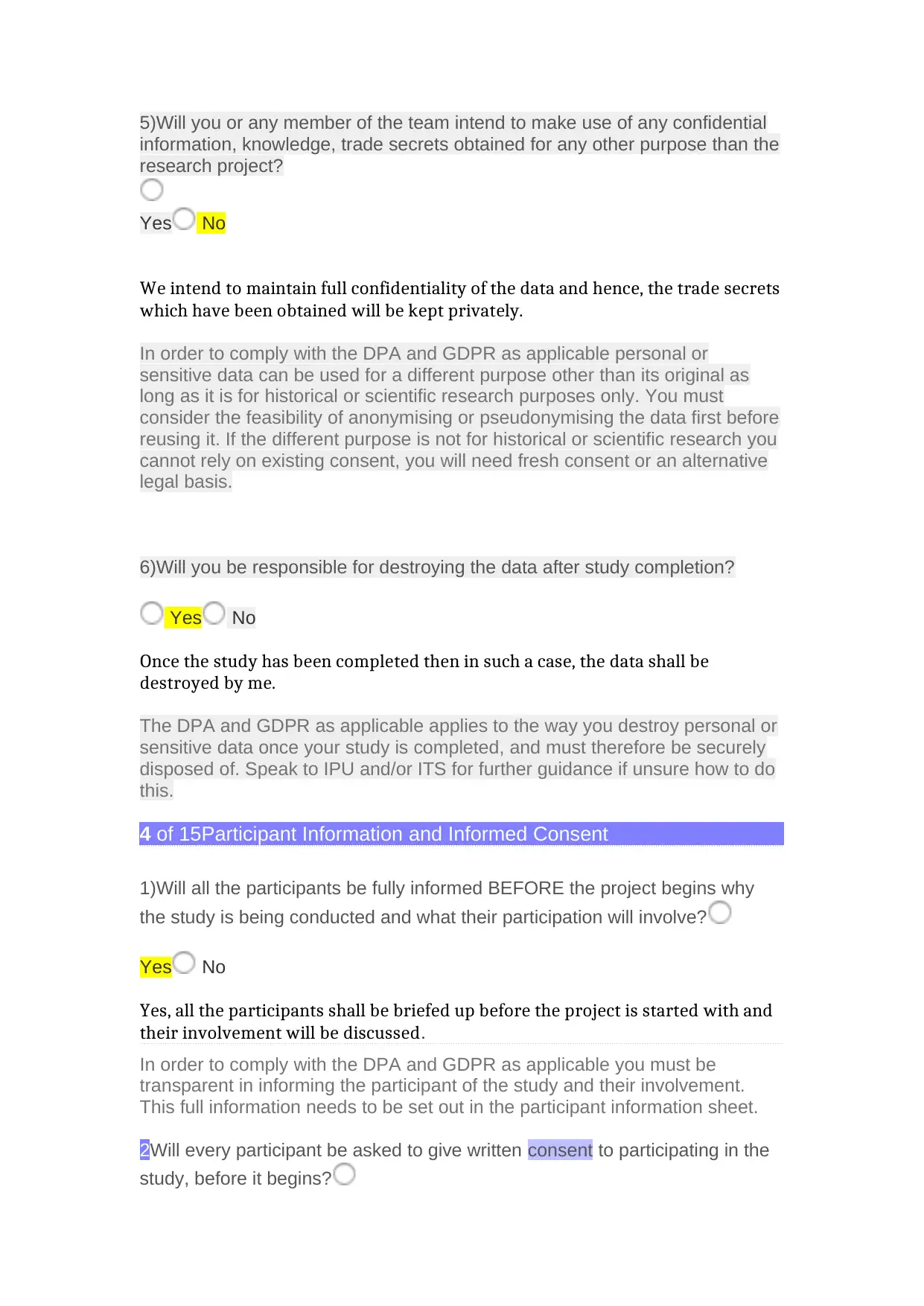
5)Will you or any member of the team intend to make use of any confidential
information, knowledge, trade secrets obtained for any other purpose than the
research project?
Yes No
We intend to maintain full confidentiality of the data and hence, the trade secrets
which have been obtained will be kept privately.
In order to comply with the DPA and GDPR as applicable personal or
sensitive data can be used for a different purpose other than its original as
long as it is for historical or scientific research purposes only. You must
consider the feasibility of anonymising or pseudonymising the data first before
reusing it. If the different purpose is not for historical or scientific research you
cannot rely on existing consent, you will need fresh consent or an alternative
legal basis.
6)Will you be responsible for destroying the data after study completion?
Yes No
Once the study has been completed then in such a case, the data shall be
destroyed by me.
The DPA and GDPR as applicable applies to the way you destroy personal or
sensitive data once your study is completed, and must therefore be securely
disposed of. Speak to IPU and/or ITS for further guidance if unsure how to do
this.
4 of 15Participant Information and Informed Consent
1)Will all the participants be fully informed BEFORE the project begins why
the study is being conducted and what their participation will involve?
Yes No
Yes, all the participants shall be briefed up before the project is started with and
their involvement will be discussed.
In order to comply with the DPA and GDPR as applicable you must be
transparent in informing the participant of the study and their involvement.
This full information needs to be set out in the participant information sheet.
2Will every participant be asked to give written consent to participating in the
study, before it begins?
information, knowledge, trade secrets obtained for any other purpose than the
research project?
Yes No
We intend to maintain full confidentiality of the data and hence, the trade secrets
which have been obtained will be kept privately.
In order to comply with the DPA and GDPR as applicable personal or
sensitive data can be used for a different purpose other than its original as
long as it is for historical or scientific research purposes only. You must
consider the feasibility of anonymising or pseudonymising the data first before
reusing it. If the different purpose is not for historical or scientific research you
cannot rely on existing consent, you will need fresh consent or an alternative
legal basis.
6)Will you be responsible for destroying the data after study completion?
Yes No
Once the study has been completed then in such a case, the data shall be
destroyed by me.
The DPA and GDPR as applicable applies to the way you destroy personal or
sensitive data once your study is completed, and must therefore be securely
disposed of. Speak to IPU and/or ITS for further guidance if unsure how to do
this.
4 of 15Participant Information and Informed Consent
1)Will all the participants be fully informed BEFORE the project begins why
the study is being conducted and what their participation will involve?
Yes No
Yes, all the participants shall be briefed up before the project is started with and
their involvement will be discussed.
In order to comply with the DPA and GDPR as applicable you must be
transparent in informing the participant of the study and their involvement.
This full information needs to be set out in the participant information sheet.
2Will every participant be asked to give written consent to participating in the
study, before it begins?
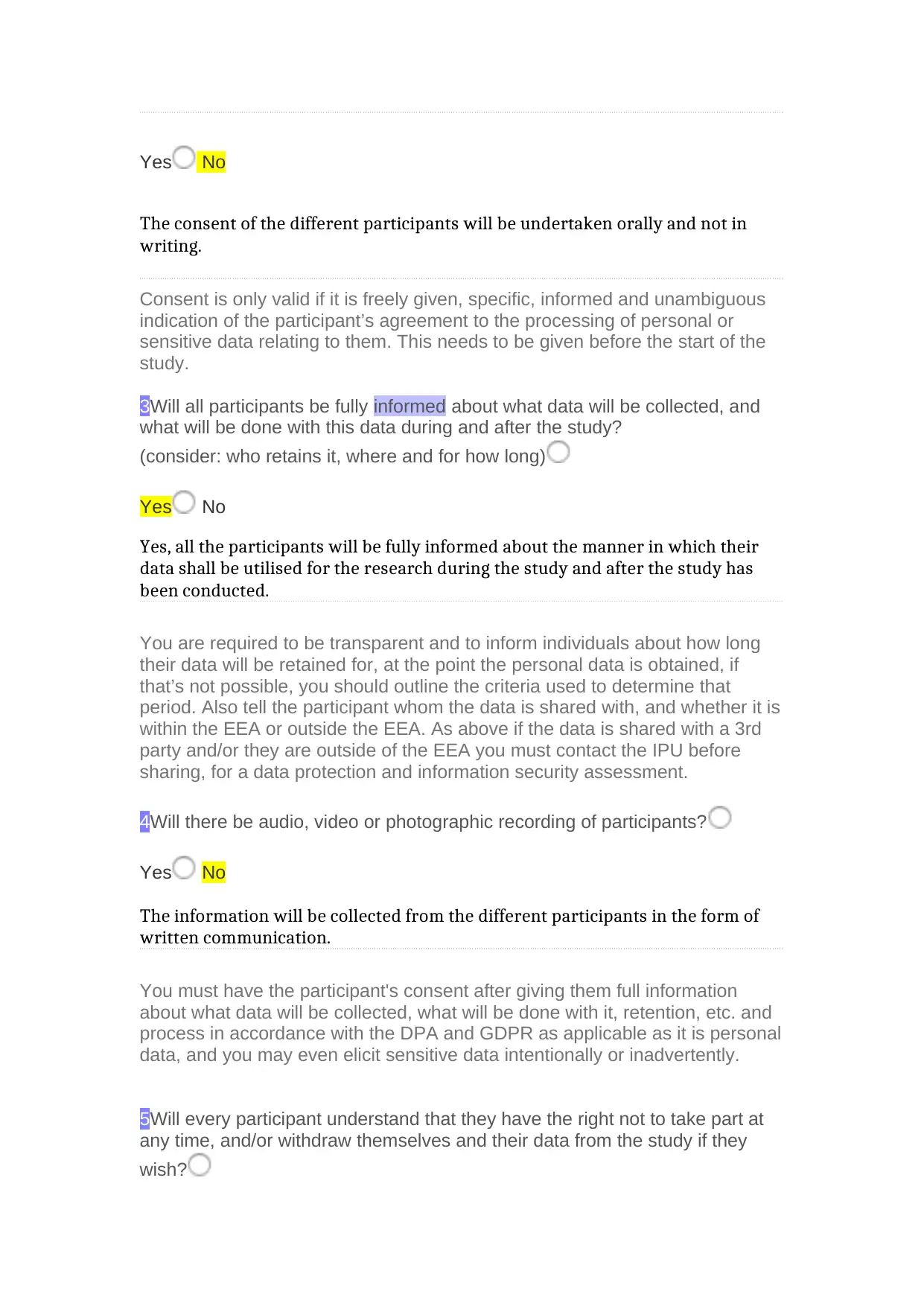
Yes No
The consent of the different participants will be undertaken orally and not in
writing.
Consent is only valid if it is freely given, specific, informed and unambiguous
indication of the participant’s agreement to the processing of personal or
sensitive data relating to them. This needs to be given before the start of the
study.
3Will all participants be fully informed about what data will be collected, and
what will be done with this data during and after the study?
(consider: who retains it, where and for how long)
Yes No
Yes, all the participants will be fully informed about the manner in which their
data shall be utilised for the research during the study and after the study has
been conducted.
You are required to be transparent and to inform individuals about how long
their data will be retained for, at the point the personal data is obtained, if
that’s not possible, you should outline the criteria used to determine that
period. Also tell the participant whom the data is shared with, and whether it is
within the EEA or outside the EEA. As above if the data is shared with a 3rd
party and/or they are outside of the EEA you must contact the IPU before
sharing, for a data protection and information security assessment.
4Will there be audio, video or photographic recording of participants?
Yes No
The information will be collected from the different participants in the form of
written communication.
You must have the participant's consent after giving them full information
about what data will be collected, what will be done with it, retention, etc. and
process in accordance with the DPA and GDPR as applicable as it is personal
data, and you may even elicit sensitive data intentionally or inadvertently.
5Will every participant understand that they have the right not to take part at
any time, and/or withdraw themselves and their data from the study if they
wish?
The consent of the different participants will be undertaken orally and not in
writing.
Consent is only valid if it is freely given, specific, informed and unambiguous
indication of the participant’s agreement to the processing of personal or
sensitive data relating to them. This needs to be given before the start of the
study.
3Will all participants be fully informed about what data will be collected, and
what will be done with this data during and after the study?
(consider: who retains it, where and for how long)
Yes No
Yes, all the participants will be fully informed about the manner in which their
data shall be utilised for the research during the study and after the study has
been conducted.
You are required to be transparent and to inform individuals about how long
their data will be retained for, at the point the personal data is obtained, if
that’s not possible, you should outline the criteria used to determine that
period. Also tell the participant whom the data is shared with, and whether it is
within the EEA or outside the EEA. As above if the data is shared with a 3rd
party and/or they are outside of the EEA you must contact the IPU before
sharing, for a data protection and information security assessment.
4Will there be audio, video or photographic recording of participants?
Yes No
The information will be collected from the different participants in the form of
written communication.
You must have the participant's consent after giving them full information
about what data will be collected, what will be done with it, retention, etc. and
process in accordance with the DPA and GDPR as applicable as it is personal
data, and you may even elicit sensitive data intentionally or inadvertently.
5Will every participant understand that they have the right not to take part at
any time, and/or withdraw themselves and their data from the study if they
wish?
⊘ This is a preview!⊘
Do you want full access?
Subscribe today to unlock all pages.

Trusted by 1+ million students worldwide
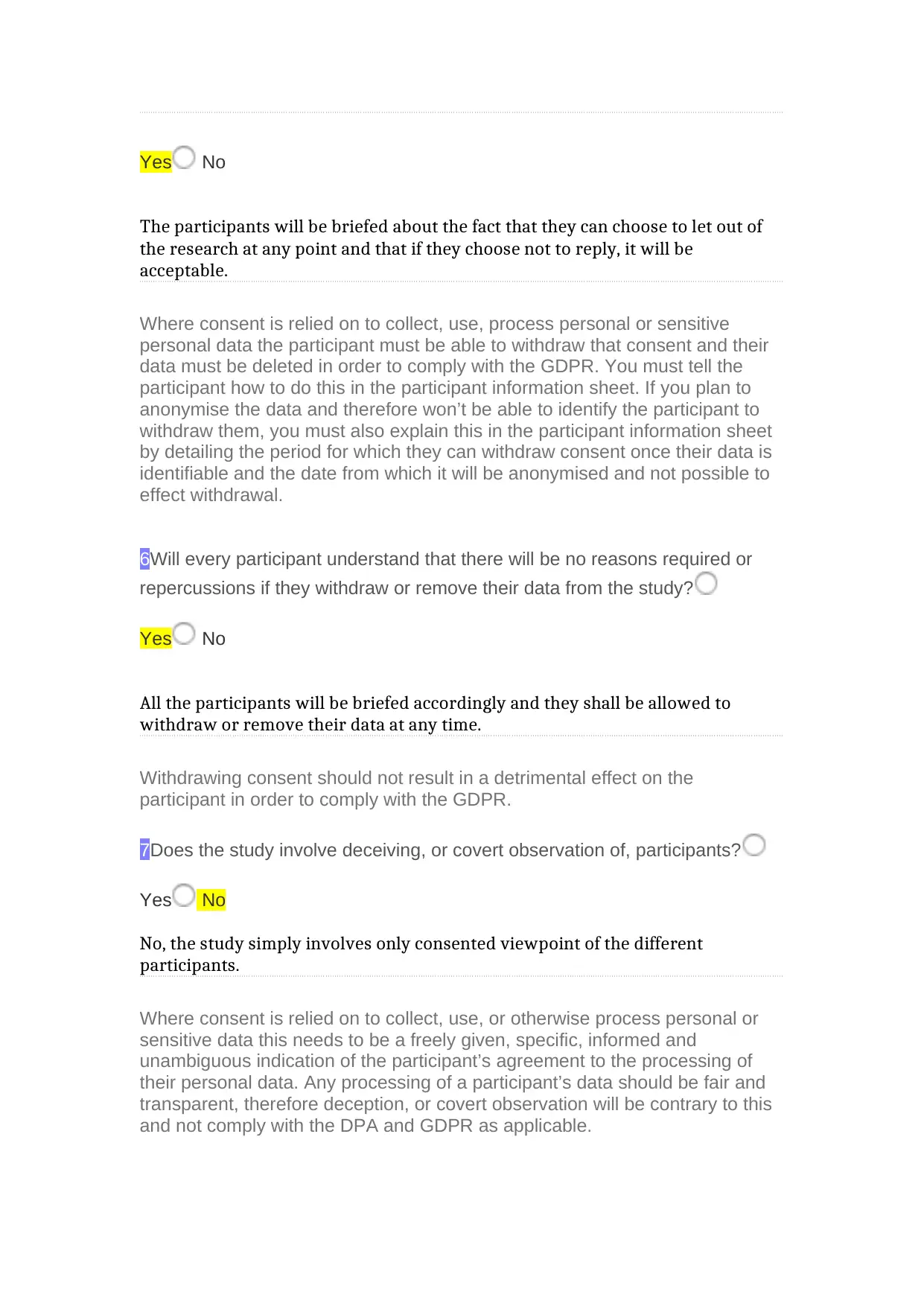
Yes No
The participants will be briefed about the fact that they can choose to let out of
the research at any point and that if they choose not to reply, it will be
acceptable.
Where consent is relied on to collect, use, process personal or sensitive
personal data the participant must be able to withdraw that consent and their
data must be deleted in order to comply with the GDPR. You must tell the
participant how to do this in the participant information sheet. If you plan to
anonymise the data and therefore won’t be able to identify the participant to
withdraw them, you must also explain this in the participant information sheet
by detailing the period for which they can withdraw consent once their data is
identifiable and the date from which it will be anonymised and not possible to
effect withdrawal.
6Will every participant understand that there will be no reasons required or
repercussions if they withdraw or remove their data from the study?
Yes No
All the participants will be briefed accordingly and they shall be allowed to
withdraw or remove their data at any time.
Withdrawing consent should not result in a detrimental effect on the
participant in order to comply with the GDPR.
7Does the study involve deceiving, or covert observation of, participants?
Yes No
No, the study simply involves only consented viewpoint of the different
participants.
Where consent is relied on to collect, use, or otherwise process personal or
sensitive data this needs to be a freely given, specific, informed and
unambiguous indication of the participant’s agreement to the processing of
their personal data. Any processing of a participant’s data should be fair and
transparent, therefore deception, or covert observation will be contrary to this
and not comply with the DPA and GDPR as applicable.
The participants will be briefed about the fact that they can choose to let out of
the research at any point and that if they choose not to reply, it will be
acceptable.
Where consent is relied on to collect, use, process personal or sensitive
personal data the participant must be able to withdraw that consent and their
data must be deleted in order to comply with the GDPR. You must tell the
participant how to do this in the participant information sheet. If you plan to
anonymise the data and therefore won’t be able to identify the participant to
withdraw them, you must also explain this in the participant information sheet
by detailing the period for which they can withdraw consent once their data is
identifiable and the date from which it will be anonymised and not possible to
effect withdrawal.
6Will every participant understand that there will be no reasons required or
repercussions if they withdraw or remove their data from the study?
Yes No
All the participants will be briefed accordingly and they shall be allowed to
withdraw or remove their data at any time.
Withdrawing consent should not result in a detrimental effect on the
participant in order to comply with the GDPR.
7Does the study involve deceiving, or covert observation of, participants?
Yes No
No, the study simply involves only consented viewpoint of the different
participants.
Where consent is relied on to collect, use, or otherwise process personal or
sensitive data this needs to be a freely given, specific, informed and
unambiguous indication of the participant’s agreement to the processing of
their personal data. Any processing of a participant’s data should be fair and
transparent, therefore deception, or covert observation will be contrary to this
and not comply with the DPA and GDPR as applicable.
Paraphrase This Document
Need a fresh take? Get an instant paraphrase of this document with our AI Paraphraser
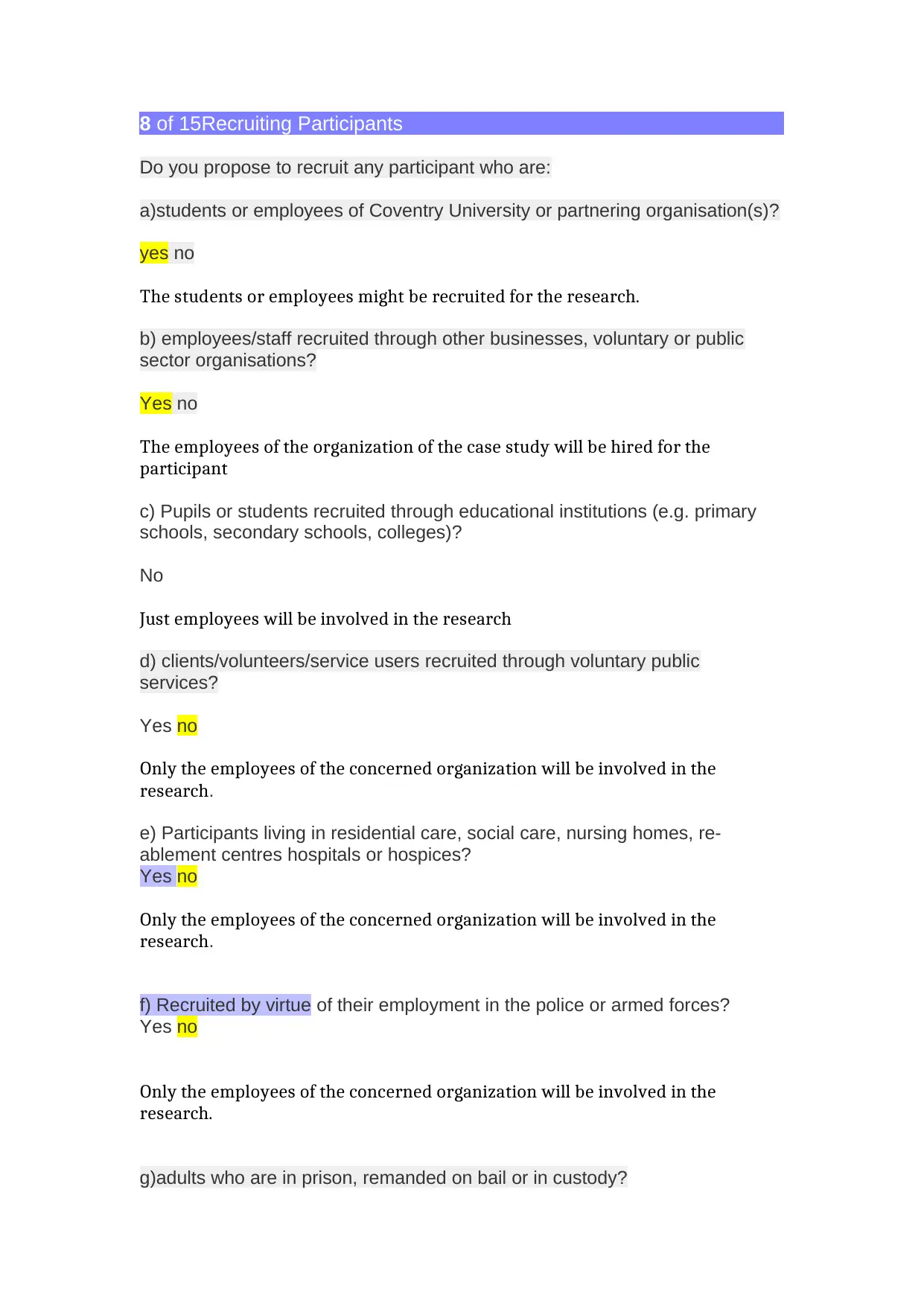
8 of 15Recruiting Participants
Do you propose to recruit any participant who are:
a)students or employees of Coventry University or partnering organisation(s)?
yes no
The students or employees might be recruited for the research.
b) employees/staff recruited through other businesses, voluntary or public
sector organisations?
Yes no
The employees of the organization of the case study will be hired for the
participant
c) Pupils or students recruited through educational institutions (e.g. primary
schools, secondary schools, colleges)?
No
Just employees will be involved in the research
d) clients/volunteers/service users recruited through voluntary public
services?
Yes no
Only the employees of the concerned organization will be involved in the
research.
e) Participants living in residential care, social care, nursing homes, re-
ablement centres hospitals or hospices?
Yes no
Only the employees of the concerned organization will be involved in the
research.
f) Recruited by virtue of their employment in the police or armed forces?
Yes no
Only the employees of the concerned organization will be involved in the
research.
g)adults who are in prison, remanded on bail or in custody?
Do you propose to recruit any participant who are:
a)students or employees of Coventry University or partnering organisation(s)?
yes no
The students or employees might be recruited for the research.
b) employees/staff recruited through other businesses, voluntary or public
sector organisations?
Yes no
The employees of the organization of the case study will be hired for the
participant
c) Pupils or students recruited through educational institutions (e.g. primary
schools, secondary schools, colleges)?
No
Just employees will be involved in the research
d) clients/volunteers/service users recruited through voluntary public
services?
Yes no
Only the employees of the concerned organization will be involved in the
research.
e) Participants living in residential care, social care, nursing homes, re-
ablement centres hospitals or hospices?
Yes no
Only the employees of the concerned organization will be involved in the
research.
f) Recruited by virtue of their employment in the police or armed forces?
Yes no
Only the employees of the concerned organization will be involved in the
research.
g)adults who are in prison, remanded on bail or in custody?
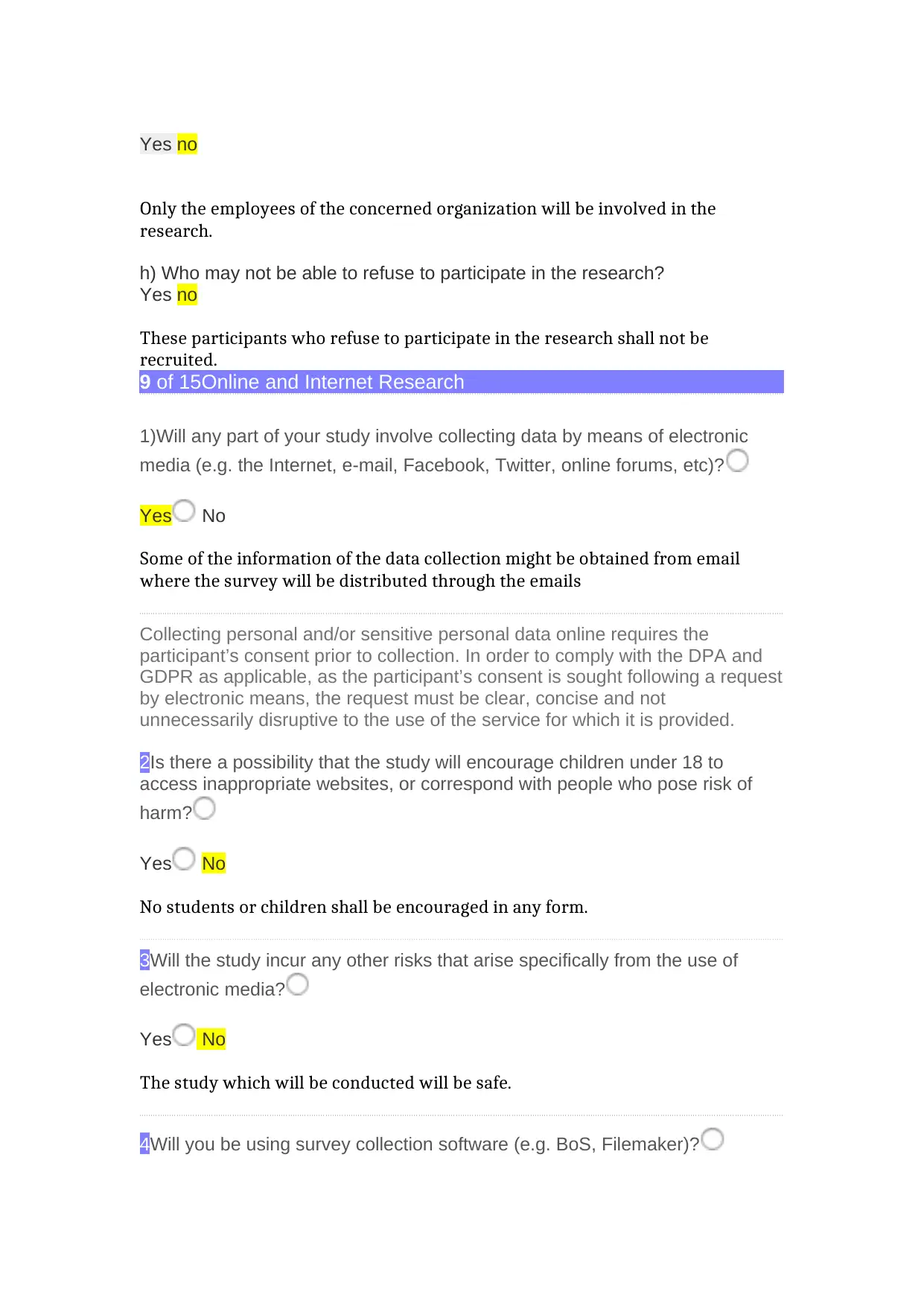
Yes no
Only the employees of the concerned organization will be involved in the
research.
h) Who may not be able to refuse to participate in the research?
Yes no
These participants who refuse to participate in the research shall not be
recruited.
9 of 15Online and Internet Research
1)Will any part of your study involve collecting data by means of electronic
media (e.g. the Internet, e-mail, Facebook, Twitter, online forums, etc)?
Yes No
Some of the information of the data collection might be obtained from email
where the survey will be distributed through the emails
Collecting personal and/or sensitive personal data online requires the
participant’s consent prior to collection. In order to comply with the DPA and
GDPR as applicable, as the participant’s consent is sought following a request
by electronic means, the request must be clear, concise and not
unnecessarily disruptive to the use of the service for which it is provided.
2Is there a possibility that the study will encourage children under 18 to
access inappropriate websites, or correspond with people who pose risk of
harm?
Yes No
No students or children shall be encouraged in any form.
3Will the study incur any other risks that arise specifically from the use of
electronic media?
Yes No
The study which will be conducted will be safe.
4Will you be using survey collection software (e.g. BoS, Filemaker)?
Only the employees of the concerned organization will be involved in the
research.
h) Who may not be able to refuse to participate in the research?
Yes no
These participants who refuse to participate in the research shall not be
recruited.
9 of 15Online and Internet Research
1)Will any part of your study involve collecting data by means of electronic
media (e.g. the Internet, e-mail, Facebook, Twitter, online forums, etc)?
Yes No
Some of the information of the data collection might be obtained from email
where the survey will be distributed through the emails
Collecting personal and/or sensitive personal data online requires the
participant’s consent prior to collection. In order to comply with the DPA and
GDPR as applicable, as the participant’s consent is sought following a request
by electronic means, the request must be clear, concise and not
unnecessarily disruptive to the use of the service for which it is provided.
2Is there a possibility that the study will encourage children under 18 to
access inappropriate websites, or correspond with people who pose risk of
harm?
Yes No
No students or children shall be encouraged in any form.
3Will the study incur any other risks that arise specifically from the use of
electronic media?
Yes No
The study which will be conducted will be safe.
4Will you be using survey collection software (e.g. BoS, Filemaker)?
⊘ This is a preview!⊘
Do you want full access?
Subscribe today to unlock all pages.

Trusted by 1+ million students worldwide
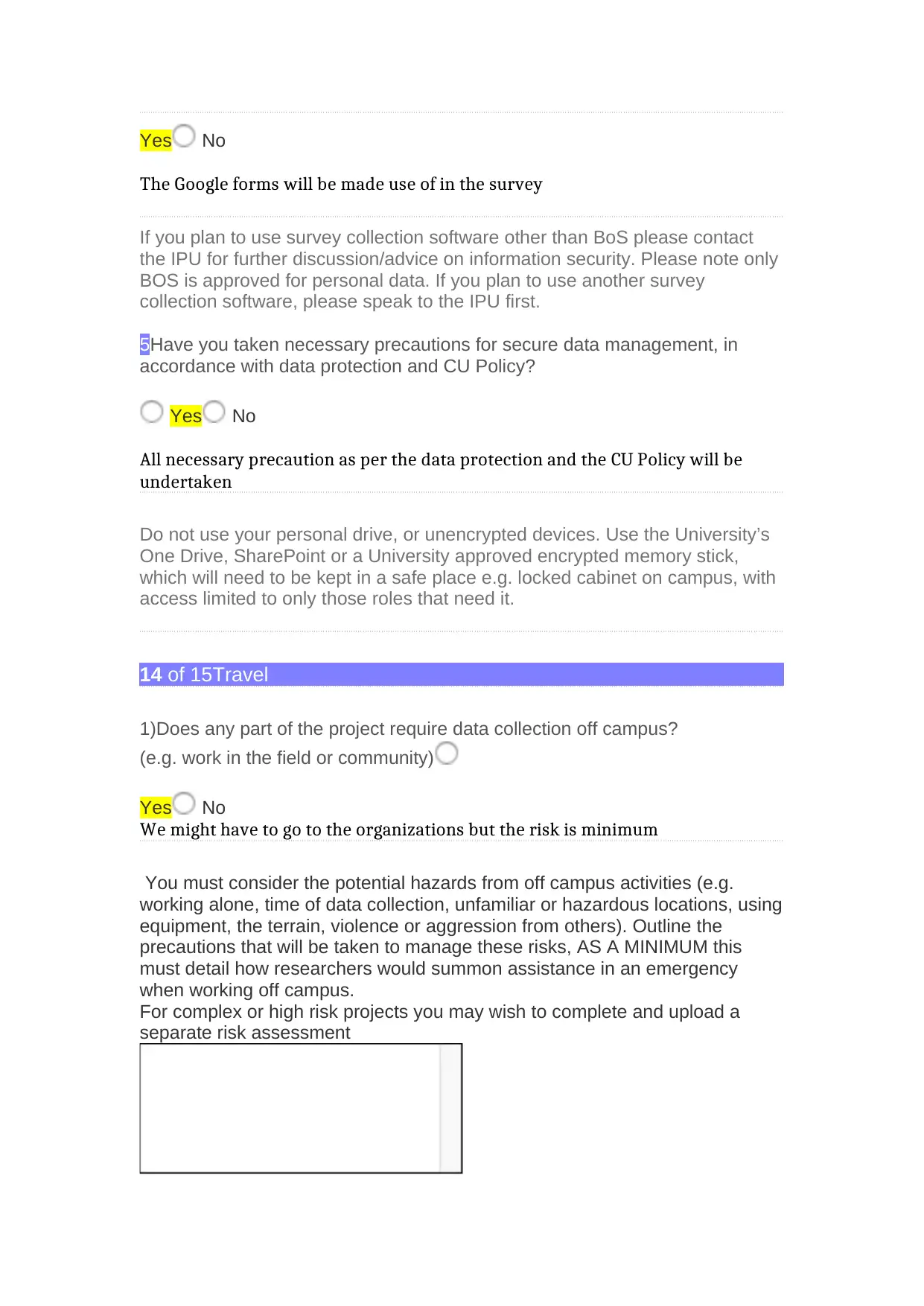
Yes No
The Google forms will be made use of in the survey
If you plan to use survey collection software other than BoS please contact
the IPU for further discussion/advice on information security. Please note only
BOS is approved for personal data. If you plan to use another survey
collection software, please speak to the IPU first.
5Have you taken necessary precautions for secure data management, in
accordance with data protection and CU Policy?
Yes No
All necessary precaution as per the data protection and the CU Policy will be
undertaken
Do not use your personal drive, or unencrypted devices. Use the University’s
One Drive, SharePoint or a University approved encrypted memory stick,
which will need to be kept in a safe place e.g. locked cabinet on campus, with
access limited to only those roles that need it.
14 of 15Travel
1)Does any part of the project require data collection off campus?
(e.g. work in the field or community)
Yes No
We might have to go to the organizations but the risk is minimum
You must consider the potential hazards from off campus activities (e.g.
working alone, time of data collection, unfamiliar or hazardous locations, using
equipment, the terrain, violence or aggression from others). Outline the
precautions that will be taken to manage these risks, AS A MINIMUM this
must detail how researchers would summon assistance in an emergency
when working off campus.
For complex or high risk projects you may wish to complete and upload a
separate risk assessment
The Google forms will be made use of in the survey
If you plan to use survey collection software other than BoS please contact
the IPU for further discussion/advice on information security. Please note only
BOS is approved for personal data. If you plan to use another survey
collection software, please speak to the IPU first.
5Have you taken necessary precautions for secure data management, in
accordance with data protection and CU Policy?
Yes No
All necessary precaution as per the data protection and the CU Policy will be
undertaken
Do not use your personal drive, or unencrypted devices. Use the University’s
One Drive, SharePoint or a University approved encrypted memory stick,
which will need to be kept in a safe place e.g. locked cabinet on campus, with
access limited to only those roles that need it.
14 of 15Travel
1)Does any part of the project require data collection off campus?
(e.g. work in the field or community)
Yes No
We might have to go to the organizations but the risk is minimum
You must consider the potential hazards from off campus activities (e.g.
working alone, time of data collection, unfamiliar or hazardous locations, using
equipment, the terrain, violence or aggression from others). Outline the
precautions that will be taken to manage these risks, AS A MINIMUM this
must detail how researchers would summon assistance in an emergency
when working off campus.
For complex or high risk projects you may wish to complete and upload a
separate risk assessment
Paraphrase This Document
Need a fresh take? Get an instant paraphrase of this document with our AI Paraphraser

2Does any part of the project involve the researcher travelling outside the UK
(or to very remote UK locations)?
Yes No
(or to very remote UK locations)?
Yes No
1 out of 8
Related Documents
Your All-in-One AI-Powered Toolkit for Academic Success.
+13062052269
info@desklib.com
Available 24*7 on WhatsApp / Email
![[object Object]](/_next/static/media/star-bottom.7253800d.svg)
Unlock your academic potential
Copyright © 2020–2026 A2Z Services. All Rights Reserved. Developed and managed by ZUCOL.




